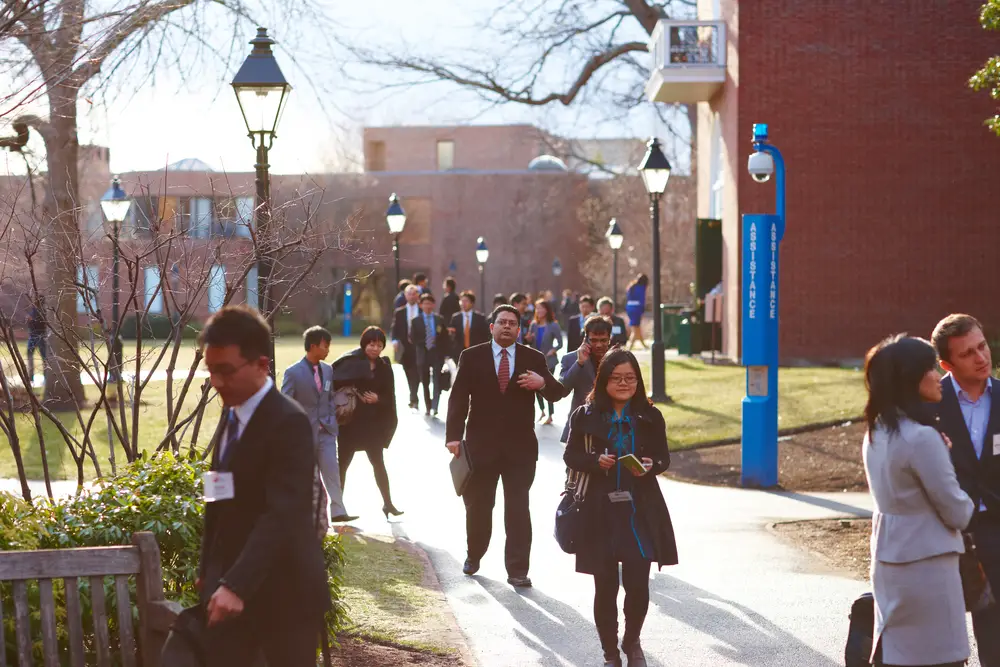Scholarships and grants are so last season. If you’re after a fresher take on financial aid, check out colleges that blend education with hands-on experience. ✨
Work-study programs can be intimidating, but they’re, without a doubt, launchpads to successful careers — and some colleges stand out for their exceptional offerings.
Here’s a rundown of the colleges with notable work-study programs in the US that can help cover the bills even before you graduate. 💵
Found a college near you? Jump right into it below! 🗺️
What is a work-study program?
A work-study program is a federal or state-funded financial aid initiative enabling students to work part-time while pursuing their studies. This is available for undergraduate and graduate students with demonstrated financial need. To apply, students must fill out the Free Application for Federal Student Aid (FAFSA) and express their interest in the work-study alternative. ✅
Wondering what kind of jobs under work-study programs are up for grabs? Colleges typically have posts related to the student’s field of study or community service. These programs also offer students valuable work experience, practical skills development, and networking opportunities. 🤝
How much aid a student receives will depend on their financial need, the school’s available funds, and the number of work hours logged in.
READ MORE: What Do I Need to Fill Out the FAFSA? Your Federal Aid Checklist
Schools Known for Their Best Work-Study Programs
1. Washington and Lee University
At present, W&L enlists more than 600 students in the Work-Study program, which provides more than 200 job opportunities both on and off campus. 😯
Beyond the classroom, there are various roles available in athletics, academic, and administrative offices. You can work as an office assistant in the Registrar’s office, a retail associate at the university store, or any of the community-based organizations outside campus.
Supervisors work closely with students to create schedules that won’t interfere with their coursework, ensuring they can manage both priorities effectively.
The program typically awards $3,000 for the academic year, requiring students to work an average of seven to nine hours per week to earn the full amount. The hourly rate ranges from $12 to $13, and dining services positions offer an even higher rate at $16 an hour. 🕐
Domestic students can work up to 29 hours a week, while international students can work up to 20 hours a week. This flexibility ensures that all students have the opportunity to participate in the program. 🙌
📍 Location: Lexington, VA
🏅 US Ranking: 1st in the US
💲 Cost of Attendance: $87,000 per year
2. Harvard University
The Harvard Federal Work-Study Program (FWSP) extends financial aid for the full academic year to US citizens and permanent residents who demonstrate financial need. To make sure things run smoothly, eligibility guidelines and regulations for both students and employers have been established. 📋
NOTE: Not every job held by a student at Harvard falls under this program. The term ‘work-study’ exclusively refers to the federally-funded aid program that subsidizes part-time student employment.

Completing the FAFSA form on time is crucial for both students and parents, as it can unlock access to valuable Federal Work-Study funds included in the financial aid package.
While juggling multiple work-study jobs is allowed, the financial aid award remains the same and needs to be divided amongst them. To keep things clear and organized, students must register all their work-study jobs with the Student Employment Office. ✍️
📍 Location: Cambridge, MA
🏅 US Ranking: 2nd in the US
💲 Cost of Attendance: $79,450 per year
3. Beloit College
By leveraging federal and institutional grants, Beloit’s work-study program ensures equal access to opportunities for all full-time degree seekers, whether they’re supported by financial aid or not.
Students can use earnings to cover and minimize college expenses or opt to get a regular paycheck. On average, the work-study award is $3,000 per year, which requires around 10 hours of work per week at $12 per hour. 💰
The program offers diverse job options on campus, from tutoring jobs to administrative roles, listed on the Student Employment Job Board. Students can also work off-campus with the Help Yourself Programs, assisting local community service organizations.
📍 Location: Beloit, WI
🏅 US Ranking: 5th in the US
💲 Cost of Attendance: $18,294 per year
4. Duke University
Did you know that at Duke, every student who applies for financial aid receives a chance to land an on-campus job and earn some cash through its work-study program? 😯
Note: Students need to be enrolled half-time in their degree program and maintain satisfactory academic standing. Additionally, those who want to continue working without work-study funding are encouraged to discuss ongoing employment with their employer.
The diverse jobs under this initiative are accessible through the Duke Student Employment System. Alternatively, students have the option to directly get in touch with potential employers when looking for part-time jobs, dive into the nitty-gritty of requirements, discuss their skills, and really show off their enthusiasm for the position. 🤙
Students can work up to 20 hours per week during the academic year, increasing to 40 hours during summer. However, exceeding your annual work-study amount can bring complications. If you’re nearing the limit, a quick email to the financial aid office is always a good first step — know about additional funding options or alternative resources. 🗓️
In 2023, the maximum work-study award was an impressive $2,200! General positions offer hourly wages from $15 to $20, and specialized roles like research assistant positions range from $16 to $23. 💰
📍 Location: Durham, NC
🏅 US Ranking: 6th in the US
💲 Cost of Attendance: $85,238 per year
5. Yale University
Whether your passion lies in research, community outreach, or teaching, Yale’s Work-Study program will give you the chance to gain hands-on experience in your field of interest. 🧑🏫
An international student with F-1 or J-1 status can participate in part-time work, but obtaining a Social Security Number is a prerequisite for on-campus employment.
Good to know: International students can regularly work up to 19 hours per week. This can increase to 20+ hours during vacations or holidays.

Yale students can benefit from Curricular Practical Training (CPT) integrated into their studies, explore roles with top international organizations, and extend their reach with the STEM OPT extension. 🔎
And for those involved in work-study positions within the YALE School of Environment, here’s the deal: you’ll be earning $15 per hour or a total of $4,000 per semester. Just commit six to 10 hours a week, especially if you’re into teaching fellowships. Not bad, right?
📍 Location: New Haven, CT
🏅 US Ranking: 8th in the US
💲 Cost of Attendance: $87,705 per year
6. University of Pennsylvania
Penn’s Work-Study program stands out for its remarkable flexibility, extending its benefits to US citizens, permanent residents, and international students alike. 👏
US citizens and permanent residents can tap into the support of Federal Work-Study funding, while international students can explore the opportunities offered through Penn Work-Study funding.
After getting a social security number and completing onboarding, international students can explore opportunities in research, administration, and teaching. 📚
The program has a maximum of 20 hours per week during classes and 40 hours per week during breaks, catering to busy students who are looking for flexible job opportunities.
Students receive their payment bi-weekly, offering undergraduates an average of $12 per hour and graduate students $14 per hour. Plus, there’s an option to convert unearned funds into a loan, supporting students in various circumstances. 🤩
📍 Location: Philadelphia, PA
🏅 US Ranking: 7th in the US
💲 Cost of Attendance: $66,104 per year
7. Boston College
Boston College’s Work-Study Program consists of two key components: Federal Work-Study (FWS) and campus employment. FWS offers on-campus positions, but students can choose its Off-Campus program to collaborate with public agencies and private NGOs. 🤝
Want to make a real impact? FWS recipients can get paid tutoring Boston-area youth through the BCNC Literacy Partnership Program (BLPP), supporting students in classroom activities or after-school programs.
Once accepted, students are considered BC employees and are directly paid by the university. This extends to opportunities with local public agencies, schools, hospitals, libraries, and community centers. 🏥
For students who may not qualify for FWS or did not apply for financial aid, the campus employment program serves as a viable alternative. They can work part-time on campus, providing up to 20 hours per week during the academic year and up to 30 hours per week during breaks. 🏫
Note: Students securing off-campus employment outside the FWS program are considered employees of that specific employer, handling payment arrangements independently.
📍 Location: Chestnut Hill, MA
🏅 US Ranking: 9th in the US
💲 Cost of Attendance: $66,410 per year
8. Vassar College
At Vassar College, students have the freedom to pick their work-study jobs instead of being assigned automatically. They use JobX, an online job application site, to explore and choose from over 1,600 positions on or near campus.
Work-study students get priority in the job application and hiring process, with exclusive access to JobX for the first month of each semester. After this period, JobX opens to all Vassar students, promoting equality and opportunity. 💻

Vassar students can pick roles matching their interests, committing up to seven hours per week in various campus departments. The college also promotes community service through the Community Service Work-Study Program, allowing students to engage with local organizations focused on education, tutoring, after-school programs, and more. 🧑🏫
Good to know: Instead of getting traditional financial aid directly applied to their student accounts, students earn work-study funds through biweekly paychecks based on their hours worked. 📅
📍 Location: Poughkeepsie, NY
🏅 US Ranking: 10th in the US
💲 Cost of Attendance: $85,220 per year
9. Wesleyan University
Discover how Wesleyan University’s Work-Study program supports a diverse array of students, including international learners, DACA recipients, and undocumented individuals. 🎓
US citizens and permanent residents eligible for the federal work-study program can seize the opportunity, with first-year students gaining a $2,750 work-study amount — courtesy of both federal and university funding.

International students with valid F-1 status can engage in on-campus employment, provided they meet specific criteria: full-time enrollment, an unexpired passport, a valid Form I-20, and an I-94 record annotated with “F-1 D/S.” 🛂
Annual work-study eligibility, based on financial need, is allocated by semester, with a crucial note: any unused portion cannot be carried over to subsequent semesters. ☑️
Good to know: For F-1 students, a valid Employment Authorization Document (EAD) is a must for off-campus employment. Importantly, understand that work-study awards neither guarantee employment nor set earnings.
📍 Location: Middletown, CT
🏅 US Ranking: 11th in the US
💲 Cost of Attendance: $86,380 per year
10. Middlebury College
At Middlebury, the Federal Work-Study (FWS) program goes beyond regular student jobs — get involved in exciting research, collaborate with respected professors, or make a difference in community projects.
The FWS program offers unparalleled flexibility, allowing students to engage in part-time work of up to a generous 20 hours per week within and beyond the campus. ✍️

On the other hand, those ineligible for FWS, such as international students with F-1 or J-1 visas, can find opportunities within the campus through the Non-FAFSA Work-Study program.
Students can use Workable to find positions inside their schools, or utilize Handshake to land jobs beyond the academe. Work hours are capped at 20 per week during the academic year, with the option for multiple jobs. During non-enrollment periods, up to 37.5 hours are allowed. New students can start working after the first day of class upon receiving their work authorization card. 🖥️
📍 Location: Middlebury, VT
🏅 US Ranking: 12th in the US
💲 Cost of Attendance: $86,880 per year
Work-study programs aren’t just about easing your financial load — they’re like backstage passes to real-world experiences, skill-building, and building meaningful connections. 💯
So, when you’re deciding on a college, think beyond textbooks and classrooms. Pick a place that not only teaches but also propels you into a future where your dreams take center stage.
Your journey to success starts with the choices you make today, so embrace the possibilities, tap into your potential, and let these colleges be your launchpad into the extraordinary adventure ahead. 🚀
Top Work-Study Colleges in the US: Frequently Asked Questions
What is the purpose of the work-study?
A work-study program serves two main purposes: to financially assist students in covering their education costs and to provide them with practical work experience.
Through part-time employment opportunities, students can save and earn money to offset expenses like tuition and books. They also bridge the gap between theoretical classroom learning and real-world applications, allowing students to obtain practical skills.
What is an example of a work-study?
Specific work-study opportunities vary depending on the school as well as the student’s interests and skills.
A student working part-time in the college library, for example, might assist with responsibilities such as stocking books, aiding library patrons, or managing resources.
A student working in an administrative function, such as conducting office responsibilities, data entry, or customer support, is another example.
Can international students get work-study in the US?
If their university is a part of the Federal Work-Study program, international students studying in the US are eligible to take part in work-study programs.
They must maintain good immigration status, possess an F-1 visa, and demonstrate financial need with forms like the FAFSA in order to be eligible. It’s critical to know that not all universities allow overseas students to participate in work-study, and that job availability varies.
Who is eligible for work-study?
Students generally need to demonstrate their financial need, which can be determined by completing the FAFSA form, in order to be eligible for work-study programs.
Additionally, they need to maintain their academic standing by enrolling in a degree program or qualified certificate program. In certain instances and institutions, having US citizenship or being a qualified noncitizen is required.


